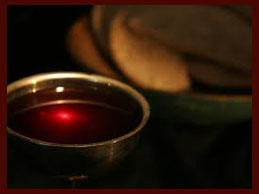 The Jewish people celebrate Passover with a festive ceremony called a Seder. At the Seder, we eat a variety of unique foods and drink four cups of wine that together represent the four aspects of Israel’s Exodus from Egypt (Exo 12:12-13).
The Jewish people celebrate Passover with a festive ceremony called a Seder. At the Seder, we eat a variety of unique foods and drink four cups of wine that together represent the four aspects of Israel’s Exodus from Egypt (Exo 12:12-13).
After the meal (which is served in the middle of the Seder), we eat a piece of unleavened bread (matzah) known as the “afikomen.” It is the last thing that we eat during the Seder and represents the Passover lamb that was sacrificed in Egypt on the night that God redeemed His people.
The afikomen is the “bread” that Yeshua broke when he celebrated Passover with his disciples, and gave it to them saying, “Take and eat; this is my body” (Mat 26:26). It is eaten is conjunction with the third cup of wine, also known as the “cup of redemption.” This is the cup that Yeshua offered to his disciples, “saying, ‘Drink from it, all of you. This is my blood of the covenant, which is poured out for many for the forgiveness of sins. I tell you, I will not drink of this fruit of the vine from now on until that day when I drink it anew with you in my Father’s kingdom’” (Mat 26:27-29).
The wine that we drink on Shabbat does not represent Yeshua’s blood (i.e., the blood of the Passover sacrifice)—it is a symbol of joy and is used to set the Sabbath apart from the other days of the week. And the bread that we eat on Shabbat does not represent Yeshua’s body (i.e., the “body” of the Passover sacrifice)—it is a symbol of God’s provision. Further, it is leavened (a type of sin in both Biblical and rabbinic literature)—something that the Bible specifically says that Yeshua is not (2Cor 5:21; Heb 4:15; 1Pet 2:22; 1Jn 3:5).